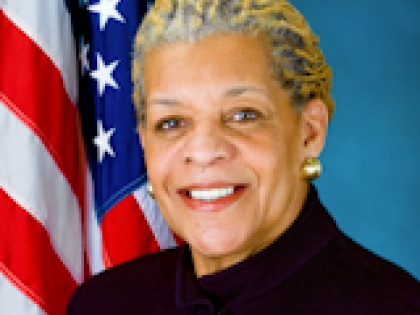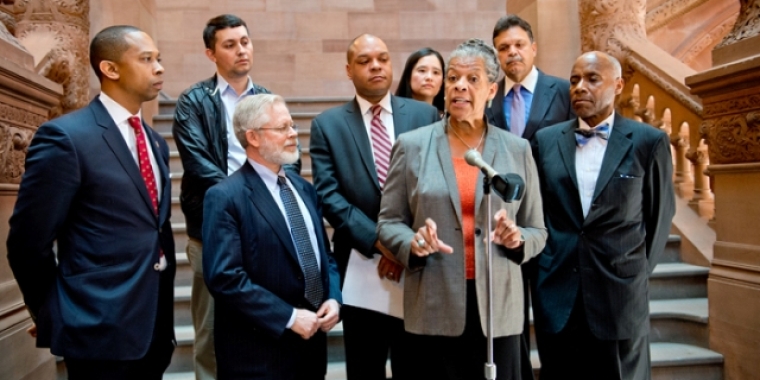
MAJORITY BRINGS MARRIAGE LAW INTO 21st CENTURY
Ruth Hassell-Thompson
June 16, 2010
-
ISSUE:
- Judiciary
Package ends NY’s status as only state lacking no-fault divorce, guarantees significant protections for women
(Albany, NY) The Senate Democratic Majority passed a legislative package which fundamentally restructures matrimonial law to improve the process and outcome of divorce for all New Yorkers, particularly women and children who are often the most vulnerable when marriages are dissolved.
The requirement under current law to determine who is at fault for causing the divorce has significant financial and emotional costs, and unnecessarily forces couples in deteriorating relationships to rehash the bitter, painful and embarrassing reasons for divorce.
To view the press conference prior to session visit
http://www.youtube.com/user/nysenateuncut#p/u/0/e4lTYPISLcY
Establishing post-marital income guidelines for maintenance awards (S7740A/Hassell-Thompson).
Ensuring that all parties can afford counsel from the beginning of divorce proceedings (S4532A/Sampson).
Senator Ruth Hassell-Thompson (D-Mt. Vernon) said, “Under New York State’s current law, couples in deteriorating relationships are forced to assign blame or fault in order to validly end their marriages. The requirement of finding fault is often unfair to children and horrendous for victims of domestic violence trapped in abusive marriages with no way out without the consent of the abuser. By implementing a policy of no-fault divorce, this prolonged and often destructive process would be eliminated.”
Senator Liz Krueger (D-Manhattan) said, "There is a reason why every other state has embraced similar matrimonial laws. For too long New Yorkers have been forced to work through a system that makes the already painful divorce process even more difficult. I am proud to be a Co-Sponsor of these bills which will undoubtedly help people during this difficult time, making it easier for them to get on with their lives."
President Pro Tempore Malcolm A. Smith, said, “These reforms do the much-needed work of protecting women, children, and domestic abuse victims where the old-fashioned New York laws did not. People seeking to free themselves from dysfunctional relationships should not be subjected to further abuse at the hand of the system that is supposed to assist them. This legislation puts the previously disadvantaged in a fairer strategic position, giving them the opportunity to get what is rightfully theirs.”
Adriene Holder Esq., Attorney-in-Charge of The Legal Aid Society, Civil Practice said, "We believe that all three of these bills will benefit our clients and all New Yorkers by streamlining the divorce process and making it less contentious and more consistent, more predictable and fairer. The process of getting a divorce in New York has often, and rightly, been criticized as taking too long and costing too much both in dollars and emotional hardship. The burdens on New Yorkers are considerable, and New York’s current laws on maintenance are responsible for a large portion of this burden. Simply put, the passage of these bills will create a simpler, faster and better mechanism for divorcing couples within New York."
Julie Chang, a client of The Legal Project said, “Because of the archaic divorce laws in this state my children and myself were held hostage, and under the current law I was treated like a criminal and was subjected to continued abuse by the Judicial system. This is wrong and must change.”
Protecting Women with No-Fault Divorce:
Passed 32-29
New York is the only state that has failed to adopt provisions allowing no-fault divorce, so that one party still must establish fault grounds, such as adultery or cruelty, to end a marriage.
The Senate Majority’s reforms would allow a divorce after a marriage has irretrievably broken down for six months or more and all financial and custody issues have been resolved. Such no-fault divorces will be particularly helpful to domestic violence survivors, whose abusers often use the system to abuse them further. Domestic violence survivors have spent up to seven years trying to get free of their abusive spouses under New York’s current fault system.
Establishing Post-Marital Income Guidelines to Ensure Fairness:
Passed 61 to 0
Most families do not have substantial assets to divide upon dissolution of a marriage—the greatest asset of the marriage is frequently the income of the more-monied spouse. The less-monied spouse has often sacrificed the ability to earn money in order to be able to care for children or elderly parents while the more-monied spouse is working.
Current law fails to provide adequate guidance as to how to divide the assets of future income in an equitable manner. Establishing post-marital income guidelines would ensure that there is consistency and predictability to post-marital income calculations across jurisdictions.
Ensuring Access to Counsel for Divorce Proceedings:
Passed 60 to 1
When an action for divorce is commenced, it is often the case that most of the marital assets available for the payment of legal fees are controlled by one of the spouses. Currently, in order to ensure that each party will have equal access to adequate legal representation judges are authorized to require the more-monied spouse to pay the legal fees of the less-monied spouse.
However, interim counsel fees are inconsistently awarded, and often not until a trial has begun—too late in the process to really be helpful. This legislation would require the awarding of counsel fees toward the beginning of the divorce process, allowing more equitable representation for both parties.
Senator Diane J. Savino (D-Staten Island) said, "Virtually every other state permits marriages to end without the condition of blame. Under current law, even victims of domestic violence who are seeking to end their marriages, must enter into a costly court proceeding, where they must also confront their abusive spouse. Providing a no-fault option would simplify the process for domestic violence survivors and potentially increase their safety. I commend Senator Ruth Hassell-Thompson for her leadership in reforming our state's antiquated divorce laws."
Senator Suzi Oppenheimer (D-Mamaroneck) said, “The break-up of a marriage is painful enough for any couple, without the financial and emotional burden of proving alleged fault. I am pleased to have co-sponsored these long overdue reforms, which will make the process of divorce fairer, less litigious and hopefully less traumatic for the individuals and families involved.”
Senate Majority Conference Leader John L. Sampson said, “A judicial order for counsel awards in a matrimonial proceeding is a vital step in preventing an imbalance in the parties' resources from affecting the proceeding's outcome. Current law places the burden upon the party in a matrimonial action seeking counsel fees, to show why the interests of justice requires it. In addition, judges appear reluctant to order counsel fee awards in matrimonial actions under the current statute. This legislation will better address today's economic and social realities, and will help ensure that no party to a matrimonial case is strategically at a disadvantage for lack of resources to pursue or defend the case.”
Sonia Ossorio, Executive Director of the National Organization for Women in New York City said, “Women seeking assistance for divorce are the No. 1 helpline call NOW-NYC receives. Most women call because they can’t afford to get divorced, while others are broke, desperate and exhausted from their on-going legal battle. Every day we see first-hand the devastation caused to women and their families due to New York’s difficult divorce laws, the New York Legislature needs to take this matter seriously and enact reforms that help women, not hurt them.”
Jill Laurie Goodman, Esq., Counsel NYS Judicial Committee on Women in the Courts said, “Post-marital income guidelines will provide divorcing victims of spousal abuse with more predictable, more certain, and fairer economic remedies. Systematic spousal abuse often leaves victims in harsh financial circumstances. Many victims flee their abusers, literally, with the clothes on their backs. Fair financial settlements are critical for victims breaking free of abusers and rebuilding lives. Post-martial income guidelines would take New York matrimonial law into the twenty-first century by making the concept of economic marital partnerships the basis for economic remedies.”
Deborah Weisman-Estis, Esq., President of the Women’s Bar Association of the State of New York said, “The Women's Bar Association of the State of New York ("WBASNY") supports the enactment of "NO FAULT" divorce legislation (Senate Bill 3890-S and Assembly Bill 9753-A), which will permit either spouse to obtain a divorce upon a sworn statement that there has been an irretrievable breakdown in the marriage for at least six months, thereby sparing spouses costly and lengthy court battles to prove fault and sparing their children the emotional damage that is often created by the crossfire of such battles.”
“Victims of domestic violence need safety and independence, and our current system of divorce laws does not reliably provide them with either. It is time to reform our divorce laws so they no longer present such an insurmountable obstacle to victims,” Ellen C. Schell,Esq., Legal Director CDWBA Legal Project, Inc said.
Catherine J. Douglass, Executive Director of inMotion and a member of the PMI Coalition's Steering Committee said, “Divorcing couples fight hard about money, with good reason, and it is those battles that lie at the heart of the nasty, expensive and lengthy litigation that so plagues the New York State courts that hear divorce cases. The real battleground for financial issues is maintenance (formerly called alimony), for which outcomes are troublingly unpredictable and inconsistent. A spouse who may well be entitled to substantial maintenance and who may badly need this income for basic economic security has two choices: engage in the ritualized battle that is litigation or abandon the claim for maintenance altogether. In fact, many litigants have no real choice; litigation is expensive, and without considerable means or the luck to find an attorney to represent them without charging a fee, maintenance is a mirage. The post-marital income guidelines contained in S.7740 are a critical part of meaningful divorce reform. These guidelines will bring deserved economic security to many divorcing spouses who now abandon their claims for maintenance.”
###
After no-fault divorce legislation stalled in the Senate for many years, the Democratic Majority successfully passed this historic legislation, (S3890A/Hassell-Thompson) to provide individuals with the ability to seek a divorce without litigating fault. Other significant reforms include:
Share this Article or Press Release
Newsroom
Go to Newsroom


